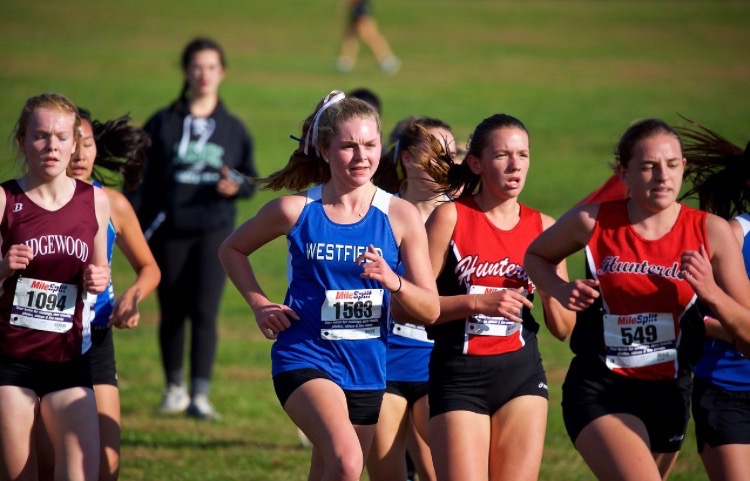A dangerous trial and error: Athletes’ battle with food
Photo Ava Maurillo
Ava Maurillo running in a cross country meet.
Lead the pack, keep the pace, push through. This mentality seemed to get me through every incline and curve of the Tamaques Park cross country course, yet failed me when I needed it most: to cross the finish line. Before I knew it, I had collapsed to the ground, my teammates surrounded me and an ambulance rushed me to the hospital.
This wasn’t the first time I had blacked out near the end of a cross country race; in fact not making it to the finish was a frustrating recurrence for me throughout my running career. I was constantly told to “drink more water” and to “stop trying so hard” but neither of these were causing my issue. The underlying problem was that I wasn’t eating the proper food needed to fuel my body for a race.
According to the Food and Nutrition Board of the Institute of Medicine, male high school athletes should consume between 3,000 to 6,000 calories a day while female high school athletes should consume 2,200 to 4,000 calories per day. When athletes don’t keep up with these calorie counts, energy levels can get drastically low which makes the risk of fainting or collapsing dangerously high.
A common misconception with running is that more food will make for a rough race. While this may be true if you eat half an ice cream cake before you run, eating the right amount of food is essential before any athletic endeavor.
“If you eat certain foods too soon to the time you race, I think it definitely has an effect [on your performance],” said senior Keeley Thompson. “The night before a [swim] meet, we normally have psych parties where we eat pasta, chicken fingers and a lot of carbs. This gives us enough time to digest but if you were to eat right before a race, it would weigh you down.”
Just as the correlation between an athlete’s food intake and their overall performance is observed in running and swimming, it is clear for wrestlers as well. “In wrestling, there are certain weight restrictions so what you eat definitely affects how you perform,” said senior Brendan Loder. “On competition days, what you put into your body the day of and the night before fuels what you do on the mat.”
No matter the sport, eating the right kinds of food before a meet, competition or game is crucial. Carbohydrates, proteins and the right kinds of fats are the ingredients for success. But what makes it difficult is that everyone has a different required “recipe” and nobody knows the exact combination of foods that will satisfy both their personal health and athletic goals.
“Your body responds to food differently than anyone else’s,” said junior CJ Composto, who is also on the wrestling team. “Now that I am a junior, I know what I have to eat but my freshman year, I had to try out what to eat and find out what I was going to feel the best on.”
Whether it was as serious as my situation or just having an upset stomach, almost every athlete has found a personalized dietary plan through trial and error. Maintaining certain habits that have proved successful on “game-day” should be continued, but dangers arise when these plans consume the athlete.
“I feel like when people maintain strict diets it can take over [their lives] in a sense,” Thompson said. “You’d start telling yourself that ‘you have to eat this’ or ‘you can’t eat that’ and you’ll restrict yourself. If you have a guide it can be helpful, but if you have a specific structure with certain times then it can be more harmful.”
On meet-day, I fell victim to the structured diet that I thought was essential for all runners. I put my concerns about getting a cramp or feeling sick during my race before my own health. Mimicking what worked for other runners simply didn’t work for me. It led me to think that there was only one way to eat before a race, and it ended up putting my health in danger.
Finding the perfect balance with food can be an impossible task for any athlete. While finding what works best for you is a key component to achieving success, it is also necessary to reach out to professionals in order to ensure your best performance and overall personal health. Ask for help. Ask a nurse or registered dietician. If the information isn’t readily available, seek it out. Don’t do it alone, because the consequences are dangerous.

